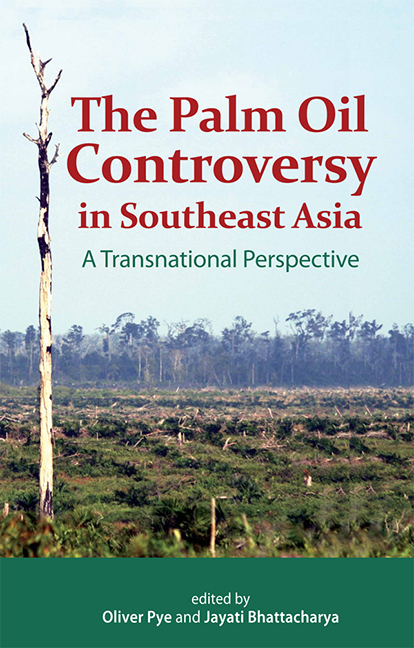Book contents
- Frontmatter
- Contents
- Foreword
- Preface
- Contributors
- Abbreviations
- 1 Introduction
- 2 Malaysian Corporations as Strategic Players in Southeast Asia's Palm Oil Industry
- 3 The Political Ecology of the Indonesian Palm Oil Industry
- 4 Evolutionary Change in the Oil Palm Plantation Sector in Riau province, Sumatra
- 5 Contradictions of Palm Oil Promotion in the Philippines
- 6 The Political Economy of Migration and Flexible Labour Regimes: The Case of the Oil Palm Industry in Malaysia
- 7 Migration and Moral Panic: The Case of Oil Palm in Sabah, East Malaysia
- 8 Reconciling Development, Conservation, and Social Justice in West Kalimantan
- 9 An Analysis of Transnational Environmental Campaigning around Palm Oil
- 10 EU Biofuel Policies and their Implications for Southeast Asia
- 11 Leveraging Product and Capital Flows to Promote Sustainability in the Palm Oil Industry
- 12 Free, Prior, and Informed Consent? Indigenous Peoples and the Palm Oil Boom in Indonesia
- Index
- Plate section
9 - An Analysis of Transnational Environmental Campaigning around Palm Oil
Published online by Cambridge University Press: 21 October 2015
- Frontmatter
- Contents
- Foreword
- Preface
- Contributors
- Abbreviations
- 1 Introduction
- 2 Malaysian Corporations as Strategic Players in Southeast Asia's Palm Oil Industry
- 3 The Political Ecology of the Indonesian Palm Oil Industry
- 4 Evolutionary Change in the Oil Palm Plantation Sector in Riau province, Sumatra
- 5 Contradictions of Palm Oil Promotion in the Philippines
- 6 The Political Economy of Migration and Flexible Labour Regimes: The Case of the Oil Palm Industry in Malaysia
- 7 Migration and Moral Panic: The Case of Oil Palm in Sabah, East Malaysia
- 8 Reconciling Development, Conservation, and Social Justice in West Kalimantan
- 9 An Analysis of Transnational Environmental Campaigning around Palm Oil
- 10 EU Biofuel Policies and their Implications for Southeast Asia
- 11 Leveraging Product and Capital Flows to Promote Sustainability in the Palm Oil Industry
- 12 Free, Prior, and Informed Consent? Indigenous Peoples and the Palm Oil Boom in Indonesia
- Index
- Plate section
Summary
The scale of transnational campaigning around palm oil is huge and diverse, reaching from village-level protests of Dayak communities in Kalimantan to small and little-known local initiatives in places like Saarlouis-Dillingen in Germany to well-known and powerful international non-governmental organizations (NGOs) such as the WWF and Greenpeace. Given the huge differences in social realities, world views, concrete criticism, and tactical and strategic differences, how do such diverse actors link up to form transnational campaigns?
This chapter looks at two key moments in transnational environmental campaigning around palm oil — the formation of the Roundtable on Sustainable Palm Oil (RSPO) and the call for a moratorium on biofuel targets in the European Union — to examine how the campaigns are framed and conducted. It argues that the debate around biofuels has led to a major shift both in the framing of the campaigns and in the protagonists involved.
ROOTED RAINFOREST COSMOPOLITANS
The rise of transnational activism has been acknowledged and analysed by academics for a number of years. In 1997 Jackie Smith already noted a substantial increase in the cross-border activities of NGOs between 1973 and 1993, and a concentration of networks around issues to do with human rights, the environment, women, peace, and the world order. She introduced the term transnational social movement organization (TSMO), which she defines as organizations with a formal structure and with members in two countries or more, to categorize this new phenomenon.
In his more recent work on transnational activism, Sidney Tarrow introduces the term “rooted cosmopolitans”, which he defines as “individuals and groups who mobilize domestic and international resources and opportunities to advance claims on behalf of external actors, against external opponents, or in favour of goals they hold in common with transnational allies” (2005, p. 29). These rooted cosmopolitans work together if a “transnational contention” develops, defined as “conflicts that link transnational activists to one another, to states, and to international institutions” (2005, p. 25).
The palm oil controversy is clearly one such “transnational contention”, but it was preceded by an earlier one over the logging of tropical forests, which linked Europe and Southeast Asia in a particular way, and which partly explains the development of the current campaigns. In 1987 road blockades by the Penan halted logging in Sarawak and became the focus for an intensive international campaign.
- Type
- Chapter
- Information
- The Palm Oil Controversy in Southeast AsiaA Transnational Perspective, pp. 179 - 198Publisher: ISEAS–Yusof Ishak InstitutePrint publication year: 2012



